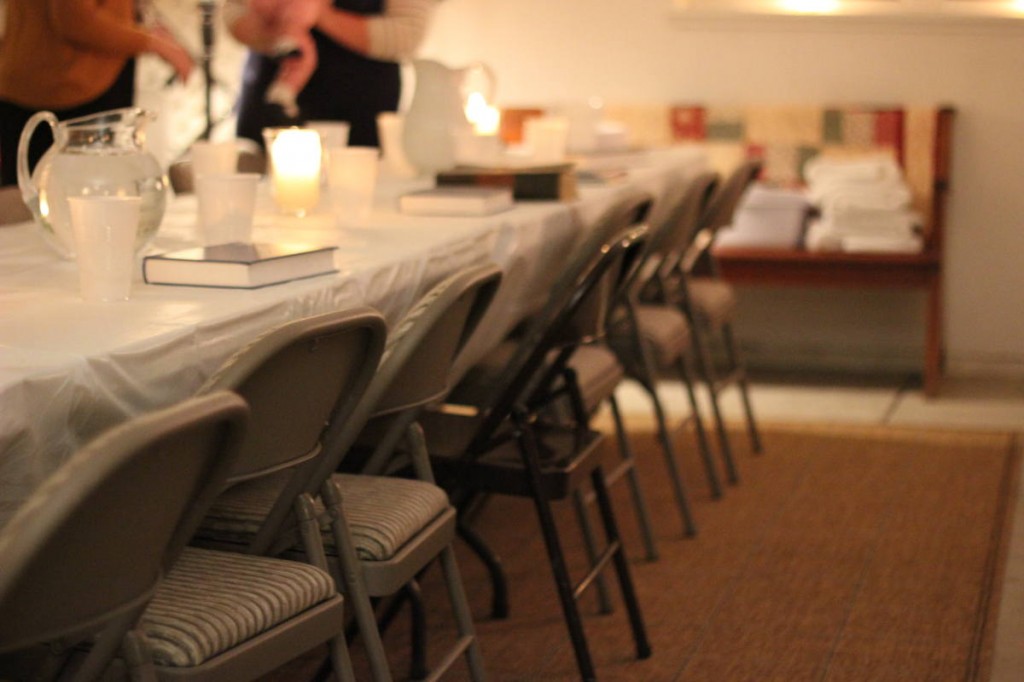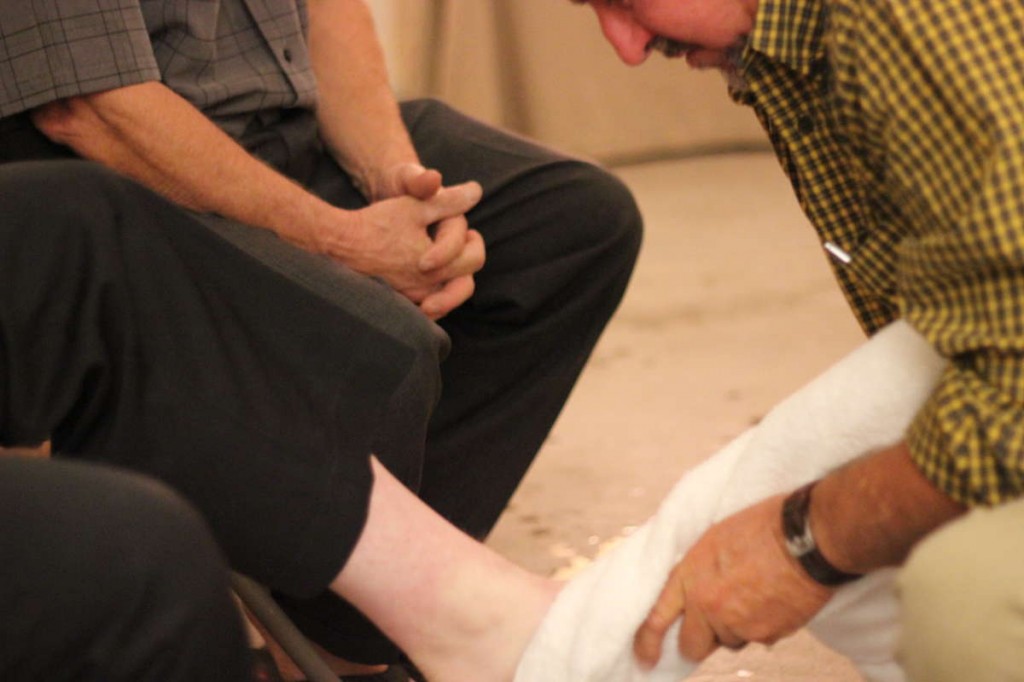Every now and then somebody asks me “So, what are you doing for church these days?”
Sometimes the question comes from people who know me and are just too tactful to ask if I’ve given up yet. Other times people genuinely don’t know. But as I begin our story I can see the unasked question forming in their mind.
“Why are you in a weird church?”
For the last three years I’ve been part of a church called Ekklesia Modesto my family started with friends.
We are currently meeting in homes but don’t have any conviction about being a house-church. For our first year we met in a wrong-side-of-the-tracks park or in a similarly situated downtown boxing gym.
We’re small – we currently have three families regularly participating.
We don’t have any official positions – nobody has “Pastor” before their name.
We are Brethren in background and Anabaptist in theology but don’t really fit with either the conservative or progressive wings of Brethren or Anabaptist groups.
I play guitar for worship services every Sunday – but we sing 99% traditional hymns.
I could go on with all the ways we don’t really fit the mainstream Christian cultural ideals of what a church should look like – but you get the idea! The church I’m attending might strike you as a little weird.
But this is my home church – where I’ve worshiped for the past 3 years, where I feel called to be, the place that’s best for me and my family.
I still haven’t answered the Why question.
Let me tackle the Why by way of another question I’ve been asked that I have an easier time explaining.
I’m a product of homeschooling. Thirty years ago my parents decided to educate me at home rather than send me to public school. This was a crazy decision at the time. Not too many people understood and supported homeschooling – least of all the truant officer!
Now days when I tell people the my eldest daughter is in 5th grade in a home-based co-op we helped start and my second daughter is a totally homeschooled 3rd grader they mostly just say “cool”!
People’s attitude towards homeschooling education has shifted. Homeschooling has gone from being considered “crazy” and “weird” to, dare I say it, almost mainstream?
This shift in opinion partly just reflects popularity – more people homeschool now than in the past – but also partly because the failures and harms of the traditional Public School system are more visible now.
Public education in its current incarnation is just broken and this is increasingly accepted. Critics like John Holt sounded crazy 30 years ago when they attacked not just the ability of the Public Schools to educate children but the very system and idea of mass standardized education.
Now everybody has an opinion on standardized testing and the flaws of Common Core standards. The fads and follies and zero-tolerance policies are widely disseminated. And when I tell people that I’m in a weird school because I don’t want to send my kids to public school – most people are sympathetic, and many want to talk about how alternative schooling works and might work for them.
Wired Magazine ran a feature recently on Silicon Valley nerds adopting homeschooling. Being Wired they got it wrong of course – their follow up editorial proclaims “Homeschooling Only Deepens Silicon Valley’s Rift With the Rest of Us”. But I found revealing that despite this opinion they couldn’t help express some sympathy with the point of view of one new homeschooling parent – the hacker ethos aimed towards education: “Heck, I could do this better myself out of my garage!”
I’m guessing you can see where I’m headed with this. All my life, for as long as I can remember thinking about such things, there have been obvious flaws in how we’ve done church in the congregations I’ve been part of. Some of those flaws seem to me to be structural problems.
I’ve been in churches with good people, fellow members of the Body of Christ. I’ve been in churches where the Gospel was preached, where the Word is respected and taught – where Jesus is proclaimed! And those churches still hurt their own people.
In fact it’s likely you agree with me about this – at least to some extent. Almost every adult I talk to about matters of faith has a story to tell about being hurt by their church. And it usually centers around conflict in their congregation and its aftermath.
I’ve seen first-hand two church failures – the congregation experienced conflict, did not resolve it, and the body split, and diminished. Relationships were sundered – people who were brothers in Christ don’t speak to each other any more. People who loved one another for years and have years of relationships simply stopped relating to one another.
My brothers, these things ought not be so.
The local church as constituted in most evangelical congregations operates as the world, operates by means of power and politics.
Members who care about the church have desires for how it should operate, who should be in charge, what it should be about. They want to be involved!
The way they pursue their desires is to seek power through the political means – building a consensus, consolidating a power base, removing obstacles, isolating enemies and promoting allies. These political means are natural, even necessary, given the institutions that we have created.
None of this the way of Jesus. None of this looks like preferring our brother before ourself. None of this demonstrates the genuine love for fellow believers that should be a primary mark of the Body of Christ. And I have rarely met anyone who is intimately involved in the affairs of a congregation who can say with honesty that they haven’t seen all this first hand.
The primary response to this sad state of affairs has been the increasing adoption of a celebrity driven model where the congregation is centered around a particular man and without that man the congregation cannot survive. The Mark Driscoll/Mars Hill story is an exemplar of the success and pitfalls of this model. I’m left with the sneaking suspicion that if the goal is to build a large, respected, and successful institution the goal may be attainable, but it won’t be the Church!
Just like the school system – the failures of the congregational models available to me has lead me to wonder whether I can do better in my garage!
So – Here I am in a weird church. I’m in a church startup that is deliberately far away from the successful institutional church – and I have to admit that sometimes I miss being part of a more conventional church.
I miss the people, the diversity that comes with a larger body. I sometimes miss just being one of a crowd and not having to call anyone if I can’t make a service. I miss having a built-in social group with friends for my kids. I miss potlucks with the random recipes of 100 other people. I miss church trips and outings and service opportunities. And sometimes I mourn for all the church experiences that I appreciated, growing up, that I don’t think my kids will get.
But I’m not missing Jesus because He is here – He is what we’re all about. Trying to be faithful, following after Jesus, is how we’ve ended up in this weird place.
I’m not missing the Scriptures because every Sunday we ponder God’s Word together – even if it is just a few of us together.
And sometimes when I’m missing the experience of Sunday worship with a large crowd instead of just a few of us gathered together I close my eyes and can see the church, God’s people through all the ages, and feel a part of that great throng all calling out “Holy, Holy, Holy” before the throne of God together.
I’m not writing this to recruit you. In fact I’d say at Ekklesia Modesto we’ve been a little ambivalent about recruiting the already-churched to join our little startup. And I can’t tell you that I have answers – I don’t even know the end of our story!
If you totally disagree with me – I hope I’ve conveyed my heart. I’m in a weird church because I seek to be faithful to Jesus.
But if you feel weird too I would like to encourage you. If you feel in your bones that faithfulness to Jesus demands that there must be a different way of being the church – you are not alone. I’d love to chat with you and swap ideas about what an alternative church culture might look like and how it can function.

